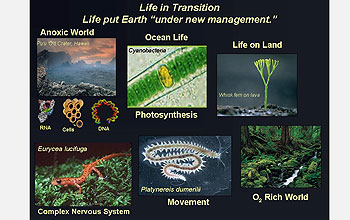News Release 08-212
National Science Foundation Assistant Director for Biological Sciences to Address American Society for Cell Biology Conference
Life in transition: Inspiring research and education at the frontiers of the life sciences

"One Biology, One Science" will be discussed at the ASCB annual conference.
December 10, 2008
This material is available primarily for archival purposes. Telephone numbers or other contact information may be out of date; please see current contact information at media contacts.
Throughout the 20th century, the life sciences emphasized the goal of controlling living systems, especially in human health and agriculture.
In the 21st century, two visions for biology, understanding life and controlling life, are combining, says James Collins, National Science Foundation (NSF) assistant director for biological sciences.
On Monday, Dec. 15, 2008, Collins will give a talk on new directions in the biological sciences--"One Biology, One Science: Biology at the National Science Foundation in the 21st Century"--at the annual meeting of the American Society for Cell Biology (ASCB).
The conference takes place at the Moscone Conference Center in San Francisco, Calif., from Saturday, Dec. 13 through Wednesday, Dec.17, 2008.
"Long ago, life put Earth under new management," says Collins." For the future of life on Earth, we must now move beyond the incremental science of traditional disciplines." Scientists need to create opportunities for the interdisciplinary research needed to transform our understanding of life, and our place in a changing world, he says.
"Of necessity, 21st century basic biological research will be driven to address important societal and planetary problems that are a consequence of our technological achievements and changing human demography," says Collins. "Twenty-first century biology must provide the knowledge needed to adapt to these changes. It is the most critical scientific frontier before us."
In response to this challenge, NSF's Directorate for Biological Sciences has introduced the theme "Life in Transition" to embrace the broad questions of adaptation, energy and origins.
Adaptation: Understanding life's evolution and diversity, including the relationship between genomes and the environment, is imperative to understanding how the living world both drives and adapts to environmental change, says Collins.
Energy: Many of life's energy systems could enable the development of re-engineered biology-based technologies for efficient, sustainable, and renewable energy, such as microbes re-engineered to produce hydrocarbons, or photovoltaic energy cells that use photosynthesis.
Origins: Unique insights into life will come from the complementary approaches of systems biology and synthetic biology, Collins believes. Systems biology embraces the concept that the whole is greater than the sum of its parts, and that properties of biological systems such as resilience and stability cannot be understood by studying these components in isolation.
Synthetic biology combines biology and engineering to design and build ("synthesize") novel biological functions and systems. "Synthetic biology has the potential to revolutionize practical applications of biological knowledge in areas that contribute to U.S. worldwide competitiveness," says Collins. "But before commercially feasible bioengineering is possible, the fundamental properties of life must be understood."
The melding of the two approaches may hold the most promise for future discoveries.
Collins' talk at ASCB is on Monday, Dec. 15, 2008, at 2:00 p.m. Pacific Standard Time (PST), in room 220 of the Moscone Center.
-NSF-
Media Contacts
Cheryl Dybas, NSF, (703) 292-7734, email: cdybas@nsf.gov
Related Websites
NSF Directorate for Biological Sciences: http://www.nsf.gov/dir/index.jsp?org=BIO
American Society for Cell Biology: http://www.ascb.org
The U.S. National Science Foundation propels the nation forward by advancing fundamental research in all fields of science and engineering. NSF supports research and people by providing facilities, instruments and funding to support their ingenuity and sustain the U.S. as a global leader in research and innovation. With a fiscal year 2023 budget of $9.5 billion, NSF funds reach all 50 states through grants to nearly 2,000 colleges, universities and institutions. Each year, NSF receives more than 40,000 competitive proposals and makes about 11,000 new awards. Those awards include support for cooperative research with industry, Arctic and Antarctic research and operations, and U.S. participation in international scientific efforts.
Connect with us online
NSF website: nsf.gov
NSF News: nsf.gov/news
For News Media: nsf.gov/news/newsroom
Statistics: nsf.gov/statistics/
Awards database: nsf.gov/awardsearch/
Follow us on social
Twitter: twitter.com/NSF
Facebook: facebook.com/US.NSF
Instagram: instagram.com/nsfgov
